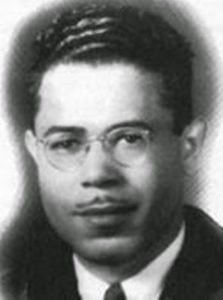
Martin D. Jenkins
*Martin D. Jenkins was born on this date in 1904. He was a Black educator and administrator.
The only child of David W. and Josephine (Miller) Jenkins, he was born in Terre Haute, Indiana. Jenkins's father was a civil engineer; young Jenkins attended a racially segregated elementary school; his middle school, Booker T. Washington, was Blacks-only, too. Once he got to high school, things began to change. He attended Wiley High School, an integrated high school of 1500 students at the time. Not only was he a great student, but he was also a standout athlete.
Jenkins was captain of the track team and its top sprinter; Jenkins established Vigo County records in the 50-yard (5.6 seconds), 100-yard (10.2), and 220-yard (24.0) dashes. He then won the district meet in the 100 and 220 to advance to the state finals. He graduated in 1921. He received a B.S. in Engineering in 1925 from Howard University. After this, Jenkins became a partner with his father in a Terre Haute highway contracting business while taking classes at State Normal.
During that time, on September 7, 1927, he married Elizabeth Lacy. He secured an A.B. degree in Education from Indiana State in 1931. After teaching briefly at Virginia State College (now Virginia State University), Jenkins began graduate work at Northwestern University and earned a master’s in 1933 and a doctorate in education in 1935. His dissertation was a socio-psychological study of Black children of superior intelligence.
From 1935 to 1937, Jenkins was a registrar and professor of education at North Carolina A&T; from 1937 to 1938, he was dean of instruction at Cheyney University, and from 1938 to 1948, he was professor of education at Howard University. Jenkins was also President of Morgan State College of Baltimore in 1948. He published more than 80 scholarly articles and monographs and lectured on topics related to his expertise worldwide. He also served on several presidential commissions, councils, and task forces.
Honored as a Distinguished Alumnus by Indiana State in 1964, Jenkins was awarded honorary doctorates by the University of Liberia, Delaware State College, Howard University, and Johns Hopkins University, among others. After his retirement as president of Morgan State in 1970, he became the director of the Office of Urban Affairs for the American Council of Education. His study of the socio-psychological study of African American children of superior intelligence went unpublished but was his most renowned and cited work.
He studied black children in the United States in 1950. He wanted to see if he could discover any Black children who could score in the 1% of white children, which would be an IQ of 130. And if a child had an IQ of 140 or above, they were deemed gifted. At the time, 16 studies were done in which Black children possessed an IQ of at least 130. And out of those 16 studies, 12 of the kids had IQs well over 140, which was the bar for gifted children. These children came from urban environments where most didn’t have the best teachers or proper learning materials, so discovering these results shocked some.
When further breaking down the data, he realized that “1% scored at 130, 0.3% scored at 140, .1% scored around 160. This, in turn, allowed him the opportunity to examine more children. He administered another set of kids the Stanford-Binet examination, a type of IQ test. This exam resulted in even better data and scores than the first set of IQ tests. The case records showed that 18 Black children scored 160 or higher on the IQ test. Seven scored above 170, four above 180, and 1 child scored above 200. Some of these kids had already finished high school at 13. And a slightly smaller number had graduated from college by the age of 13. The evidence was irrefutable that black kids in that day and age were just as intelligent, if not more intelligent, than their white peers. This was a breakthrough not only for Dr. Jenkins but also for Psychology as a study.
When he accepted the Presidency, the 20th-century American Civil Rights Movement was in its prime. Many students and professors on campus were deeply involved in the movement. Dr. Jenkins felt that Morgan State should have nothing to do with the movement as an institution of higher learning. Many thought he was betraying his race because he had so much power and influence, but failed to use it in support of the movement. Dr. Jenkins was a practical and conservative-minded man.
He only wished to enhance the students' experience without participating in the movement. He felt that the student body was racially unbalanced, so he sought to find and recruit more white students to attend Morgan State. Many students and faculty disapproved of this choice, and some even protested the decision on campus. He felt that by interacting with white students, they would learn to function in society more effectively. Known for his pioneering work in education, Dr. Martin D. Jenkins died in 1978.
Morgan State University
1700 East Cold Spring Lane
Baltimore MD 21251
443.885.3333